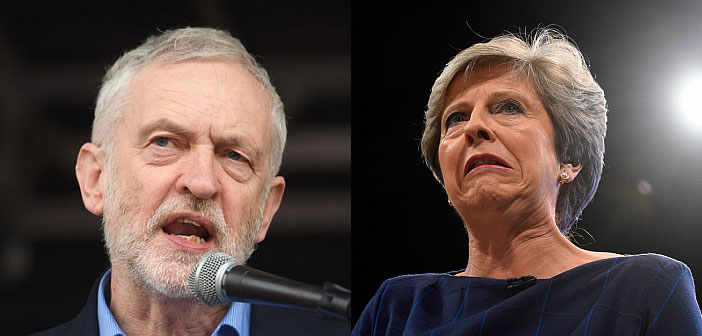For the first time in generations, the Labour Party is led by a man who offers a decisive break with the status quo.
Amidst the chaos of her Brexit negotiations Theresa May still hangs on. For how much longer, who knows? But, as John Wight explains, her best hope for survival is the establishment’s fear and trembling over the prospect of her being replaced by a government led by Jeremy Corbyn.
British Prime Minister Theresa May is well on course – if indeed she is not already there – to go down down as the most weak and ineffectual Tory prime minister since John Major presided over his cabinet of ‘bastards’ in the early nineties.The escalating crises that are now a near daily occurrence within May’s government and cabinet are symptomatic of a Tory party which is irretrievably split on Brexit between no-deal fundamentalists, of whom Foreign Secretary Boris Johnson is most prominent, and soft Brexit single market adherents, led by Chancellor Phillip Hammond.
It is in the context of this split, which has grown evermore deep and antagonistic over the months of deadlock and lack of progress in the government’s Brexit negotiations with Brussels, that Theresa May has been drained of personal authority to the point where the likes of Johnson and her former International Development Secretary, Priti Patel, have felt emboldened to go rogue and plough their own furrows. Add to the mix the recent resignation of Defence Secretary Michael Fallon over sexual harassment revelations, and at this writing the mounting pressure on her Secretary of State Damien Green to resign over similar allegations of sexual impropriety, and Theresa May has been reduced to a political mannequin.
However for the British establishment the only thing worse than a mannequin in Number Ten is Jeremy Corbyn, whose popularity and personal standing as leader of the opposition and prospective prime minister since June’s general election has only increased. Indeed a seesaw effect between Corbyn’s increasing popularity and May’s increasing unpopularity is now markedly evident.
The reasons for establishment dread of what a Corbyn government portends are easy to discern. For the first time in generations, the Labour Party is led by a man who offers a decisive break with the status quo ideologically, economically, and on foreign policy. While certainly not the Marxist his detractors claim, Jeremy Corbyn is a socialist who believes in redistributing the bulk of society’s surplus to the working class, doing so in the context of increasing investment in public services, a living wage, public ownership, investing in affordable housing, and supporting an enlarged role for the unions in the workplace when it comes not only to defending wages and conditions but improving them.
Taxing the rich, business, clamping down on tax evasion and avoidance, while introducing tighter regulation in the financial and banking sector, ensures that for each of the groups affected, Corbyn looms over the horizon as a latter day Che Guevara intent on fomenting bloody revolution. It is a primal fear reflected in the concerted attempt to destroy his leadership from the moment he was elected leader of Labour in 2015 up to the aforementioned general election, when in cementing his authority with a campaign performance that ranks as one of the best of any Labour candidate for Downing Street ever, it was clear their efforts had failed.
Illustrating the dread within the UK financial and banking industry of what Corbyn represents economically was its hysterical response to Labour’s intention of introducing a financials transaction tax (Robin Hood tax) of 0.5 percent per transaction, bringing with it the prospect of raising up to an additional £5.6 billion in government revenue by 2021/22. With Shadow Chancellor John McDonnell leaving no doubt that the tax was designed to “make the financial sector pay its fair share,” especially given its role in the 2007/08 economic crash, we are talking an economic policy underpinned by an ideological commitment to meaningful wealth redistribution.
Even more danger is attributed to what Corbyn’s foreign policy would entail, how it would impact and change Britain’s various international alliances and commitments. The Labour leader’s years-long support for the cause of Palestinian self-determination is well known, as is his dim view of Britian’s arms trade with Saudi Arabia, its membership of NATO, the Atlantic Alliance with Washington, and on a personal level at least Britain’s Trident nuclear deterrent.
With this in mind, one man who is in no doubt that Corbyn should be kept away from Number Ten at all cost is Sir Richard Dearlove, former head of Britain’s foreign intelligence agenct MI6. Writing in The Telegraph on the eve of the general election in June, Dearlove opined, “the leader of the Labour Party is an old-fashioned international socialist who has forged links with those quite ready to use terror when they haven’t got their way: the IRA, Hizbollah, Hamas. As a result he is completely unfit to govern and Britain would be less safe with him in No 10.”
The fact that the real danger to Britain’s security in recent times has been a foreign policy responsible for the proliferation of international terrorism, the worst relations with Russia since the Cold War, and a refugee crisis of biblical proportions, is obviously lost on Mr Dearlove and the establishment he represents and undoubtedly speaks for. However the point remains: Jeremy Corbyn is the British establishment’s worst nightmare and the primary reason Theresa May has not yet been kicked to the kerb, risking in the process an early general election which Corbyn would almost certainly win at this point.
If the leader of the opposition was a Blairite and thus represented continuity rather than change, she would already be toast at the hands of her very own cabinet and party of ‘bastards’. “My crown I am,” Shakespeare wrote, “but still my griefs are mine. You may my glories and my state despose but not my griefs; still I am king of those.”

